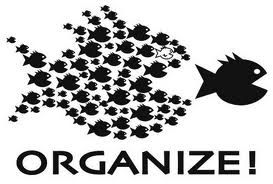In political philosophy,
the individualist theory of government holds that the state should take a merely defensive role
by protecting the liberty of each individual
to act as he wishes as long as
he/she does not infringe on
the same liberty
This contrasts with
every
collectivist political theory,
where, rather than
leaving the individual
to pursue his own ends,
the state ensures that
the individual tax payer serves
the interests of society
when taken as a whole.
It also contrasts with fascism, where the individual tax payer is required to serve the interests of the state.
The term 'political individualism' has also been used to describe "individual initiative" and "freedom of the individual" in general, perhaps best described by the French term "laissez faire," a verb meaning :
"to let the people do" for themselves
what they know how to do.
In practice, individualists are chiefly concerned with protecting individual autonomy by opposing encroachment by the state. They pay particular attention to protecting the liberties of the minority against transgressions by the majority and see the individual as the smallest minority. For example, individualists oppose democratic systems unless constitutional protections exist that preserve individual liberty of individuals from being diminished by the interests of the majority. These concerns encompass both civil and economic liberties. One typical concern is
the concentration of commercial and industrial enterprise
in the hands of the state, and the municipality.
that popularly-elected representatives are not likely to have the qualifications, or the sense of responsibility, required for dealing with the multitude and complexity of enterprise, and the large sums of public money involved in civic administration; and that the "health of the state" depends upon the exertions of individuals for their personal benefit.
The individualist sees society as "a large number of individuals working together" to improve their individual and collective welfare. The individual person is not just a member of a greater unity. In fact, the individual is seen as "the ultimate unity," and society is nothing more than a composition of these "individuals". The "state" is an organized form of society, which "ensures the individual's freedom" by law. Thus, individualist policy tends to approve laws that protect, or otherwise enhance the liberties of every individual citizen, but rejects laws that subordinate the individual to the collective.
In Quebec individual tax payers are offered 'variations' of the same old 'collectives' to address the systemic and viral problems of corruption and exclusion that have been allowed to infiltrate our governance for decades. Be they 'nationalists' or 'socialists' of the right or left - primary consideration for the rights of every individual is lost in the power-lust of the collective. Use of the term 'FREEDOM' in this political culture, refers as it always has to 'Freedom of THEIR COLLECTIVE MAJORITY' .. not YOUR FREEDOM - NOT CHANGE - NOT EVOLUTION ... fraudulent, amoral, destructive collectivism ... THIS TIME ... for YOUR SAKE and FOR YOUR FUTURE - step up and JUST SAY NO ...
In Quebec individual tax payers are offered 'variations' of the same old 'collectives' to address the systemic and viral problems of corruption and exclusion that have been allowed to infiltrate our governance for decades. Be they 'nationalists' or 'socialists' of the right or left - primary consideration for the rights of every individual is lost in the power-lust of the collective. Use of the term 'FREEDOM' in this political culture, refers as it always has to 'Freedom of THEIR COLLECTIVE MAJORITY' .. not YOUR FREEDOM - NOT CHANGE - NOT EVOLUTION ... fraudulent, amoral, destructive collectivism ... THIS TIME ... for YOUR SAKE and FOR YOUR FUTURE - step up and JUST SAY NO ...






